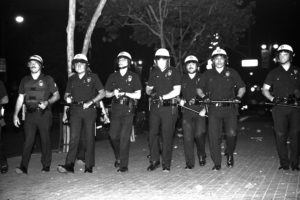I’m going to be interviewed in a few days on the subject of incivility.
In preparation, the interviewers asked me what experience I have had in dealing with incivility during my life.
I gave a chippy answer: “I’ve had five children and fourteen grandchildren. Enough said?”
I recovered and gave it a little more thought.
Here are a few of my observations about incivility (and civility) as I have experienced both over the years.
Los Angeles Race Riots of 1992
For as long as I can remember I’ve had a more liberal streak in me, especially when it came to interacting with members of my church.
I can remember telling my rich friends who lived on the affluent Palos Verdes Peninsula in southern California that one day hordes of angry young African Americans would storm the hill.
I had always been a believer that one of the great threats to civil society is the gap between rich and poor. If the gap becomes too great, the poor rise up in rebellion.
On April 29, 1992 the Los Angeles Race Riots broke out, ignited by innocent verdicts handed down to police officers who had beaten a black man, Rodney King.
The downtown suburbs of Los Angeles were set ablaze. 1,100 buildings were destroyed by fire, 2000 people were injured, 53 people were killed.
When the riots finally subsided six days later, my family decided to go and help clean up the ravaged city. Word spread rapidly in our community, and before we knew it there must have been a caravan of thirty cars and trucks loaded with food and tools to accompany us. They were all my conservative church friends.
As we traveled down the hill, and stopped at street lights, people would come up and throw money into our cars.
As we pulled off the downtown freeway, we were venturing into no man’s land. It was South Central L.A, the heart of African American territory. No white man dare set foot in there. And yet there we were. All thirty cars and trucks full of food, baby formula, money, tools, and WHITE people.
I was scared as we drove into the area. I was in the lead truck, and could sense the shock and surprise on the faces of the residents. This was a first for them as well as for me.
I rolled down my window and asked where we could take the supplies. The residents directed us to a church that had a soup line. We dropped part of our load off, and were told there were other churches that had even greater needs. All that day we delivered supplies all over the smoked filled riot zone.
The next day we brought more food and more white people. We spent most of the next three days in south central with our families cleaning up, and preparing boxes of food. Thousands from all over the county descended on the riot torn area. Anglos, Hispanics, Asians, and African Americans worked together in big warehouses to prepare and box food, hygiene kits, and clothing.
Our religious group made friends with different religious congregations. Those friendships and exchanges lasted for years.
Acts of incivility turned into relationships of civility.
A Paradox
It was a paradox wasn’t it? I told my friends that African Americans would come up the hill to foment acts of incivility on them. Instead, cocooned, wealthy white people got off their hill and engaged in acts of civility that were received and returned liberally.
That race riot changed the atmosphere in Los Angeles City. Police reform took place, a new mayor was elected, the University of Southern California became the most effective outreach campus in the country, public funding became available to rebuild blighted areas, and cross racial organizations from all over the county was created to help meet the needs of those who had suffered from the violence.
I believe that southern California has become the greatest multi-cultural civilization that works.
My way of seeing things has matured. My rich/poor model became more refined. People in positions of power and wealth are the first to support civility. If, however, this view does not help people without power and wealth meet their needs, incivility will result. If people in power work to meet the needs of the powerless, civility will be restored. When the powerless feel empowered, and the poor gain access to wealth, civility is the natural result.
Incivility in everyday society is the biggest hint we have that groups of people are not having their needs met. Break outs are not a sign that society is collapsing; rather it is a starting point of adjustment and reorientation of resources to create greater balance and fairness in communities.
Incivility is a concept that helps establish a more authentic civility. Incivility brews beneath the surface of every society all the time. It has no ideological preference. Successful societies respond to incivility, rather than attempting to smother it.
